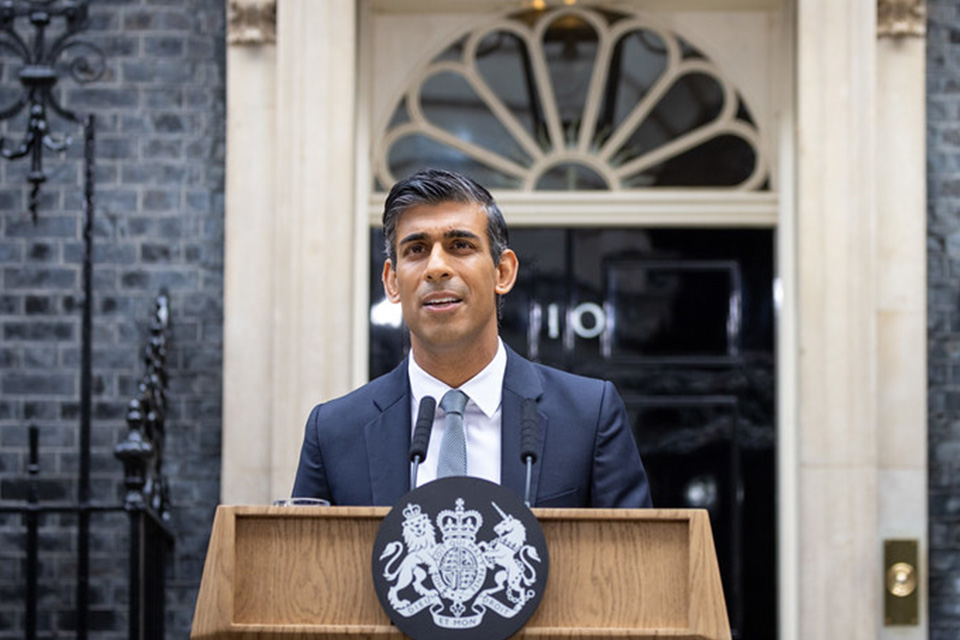Cowper’s Cut 319: The Great British Health Irrelevance-Off widens scope with PM Sunak’s face-off against Bob the whippet, as The Next Big Screw-Up emerges

The reverse ferret
We are very pleased with the decision taken by NHS England to extend our service provision for the next 12 months so that we can continue to support our colleagues in both primary and secondary care.
— NHS Practitioner Health (@NHSPracHealth) April 17, 2024
We are similarly grateful for the leadership that they have shown in the last… https://t.co/djGNQWUtql
Well, that didn’t take long.
I wrote last week that the ludicrous decision to withdraw the NHS Practitioner Health service access to secondary care staff would not stand.
We don’t always get things right and I really want to encourage people continue to speak to us about these issues so we can make the right decisions for our patients and staff.
— Amanda Pritchard (@AmandaPritchard) April 17, 2024
Nor was I wrong.
NHS England’s ineptitude-prone chief executive Amanda Pritchard announced the inevitable reverse-ferret with the heroic understatement “we don’t always get things right”. You don’t say, Amanda.
This was driven by the impact of a successful social media campaign of signing an open letter of support for maintained access, orchestrated by author and medic Dr Rachel Clarke and medic Natalie Silvey. Diabetes consultant Partha Kar’s backstage influence probably also had an impact on Secretary of State For Potentially The Whole Next Eight Long Months Victoria Atkins’ instruction that this frankly ludicrous decision be reversed.
I have heard the concerns of NHS staff in recent days.
— Victoria Atkins (@VictoriaAtkins) April 15, 2024
You deserve to have the right support.
After meeting with @NHSuk this morning, I am pleased that this important service will be maintained for both existing and new patients. https://t.co/XFOWsISfJi
Here comes The Next Big Screw-Up
NHS Practitioner Health access for secondary care may be sorted for another year, but The Next Big Screw-Up is already hoving into view.
I've chased every few days since then but have still to get any numbers out of them. I'm having to resort to FoI to get the information. Meanwhile a lot of young doctors are wondering where they are going to be living for the next 2 yrs, what it means for relationships etc. 2/2
— Alison Moore (@AliJaneMoore) April 18, 2024
Sexy as ever, the subject of doctors’ training is back on the agenda in a big way. And what is currently happening may well end up making the MTAS/Modernising Medical Careers debacle look like a little light relief.
Health Service Journal’s Alison Moore has been picking up traces of the problems facing graduating doctors’ applications for Foundation Year 1 places for a while now. She has heard rumours that 1,000 such training doctors may be without confirmed placements until July, and they are due to start those job placements in August.
I’m grateful to a well-informed Cut subscriber for his interpretation of the state of the mess. It is, shall we say, lively.
“The old placement system had some pretty deep flaws. But had at least the illusion of some meritocracy. So HEE invented a new system of random allocation, under which students are asked to rank which of the 18 foundation schools / regions they want to work in across the U.K.
“There’s some hocus-pocus algorithm that sorts everyone according to preference - but students are advised to avoid putting the most popular regions / Foundation schools first, because allegedly that increases the chance you won’t be matched to it.
“But the students are blinded to how competitive the regions are so essentially have to guess which are the least worst regions and rank those at the top of their list if they want to avoid the risk of not matching to a half-decent school.
“And that (as I say) is all educated guesswork. So most people do what the student I spoke to yesterday did: they reason that London is massively oversubscribed but that East of England (though less preferable, because of where his family lives and where he went to med school), is more likely to result in him matching.
“Only in his case he has matched to East of England BUT for reasons he doesn’t understand, there isn’t actually a job in that region for him. So he’s designated as having “PLACEHOLDER” status. (Something that HEE informed them of by email, without actually explaining what it was to be a “placeholder”.)
What “placeholder” actually means is that there’s no job for him, and they won’t be able to tell him if he has a job (or where) in the whole of the East of England until July. (FY jobs start in August).
“Furthermore, there is a chance that there is no job in East of England, and he gets sent to somewhere that doesn’t have an FY1 vacancy. There are something like 1,000 students designated as Placeholder status across the U.K.
“Even among those who matched to an actual job, there are 5% or so who matched to choices they ranked 8th to 18th out of 18 regions. And there’s lots of chatter for the people who have matched to low preference regions that they will just up sticks and take a year out (there’s nothing that stops them from doing so).
“Because in the perversity of this random allocation scheme, they figure better to take a test out and come back to the roulette table next year than have to spend 12 months of their first house job in - say - Northern Ireland.
“A total mess, which I suspect will create a new generation of pissed-off junior doctors, who feel that they owe the NHS nothing.
“Lastly: there’s some amusement in trying to track down who is actually the architect responsible for this epic balls-up. Currently, nobody is owning up to it!”
As ever, success has many parents: failure is an orphan.
Health policy’s new hero: Bob the whippet
This week saw The Great British Health Irrelevance-Off widened its competitive field, diversifying out from the recent head-to-head battle between NHS England and SOS Victoria Atkins.
Wonderfully, our prior core contenders weren’t giving up without a fight.
We're creating a faster, simpler and fairer NHS for patients.
— Department of Health and Social Care (@DHSCgovuk) April 20, 2024
🎙️ We caught up with Health & Social Care Secretary @VictoriaAtkins on the progress we've made so far 👇
Feat. Bob, Chief Whippet 🦮 pic.twitter.com/TCcBztQ7cq
Health But Social Care Secretary Atkins was at the bizarre video-making again this week, with her best supporting SOS appearance in Bob the whippet’s promotional film.
Just kidding! (Possibly.) Mrs Atkins outlined the Government’s health, NHS and care achievements, in this classic of bathos PR. It is indeed thin gruel.
Observant viewers will note that her whippet Bob is wearing a poppy rosette. Now either this is some kind of ‘hanky code’ flag for Bob the whippet’s niche sexual preferences (in which case please don’t under any circumstances let me know what it is), or it’s an attempt to appeal to the ‘POPPIES ALL YEAR ROUND IN ANY CIRCUMSTANCES!’ type of military traditionalist.
In neither circumstance would it be a good thing.
Sunak speech plans to remove GPs’ role in sicknotes

There is a school of thought that says you shouldn’t kick a man when he’s down.
Mmmmmmmmmm.
This school ignores that fact that it’s far and away the optimal time to do so, in terms of the effort-to-reward ratio. PM Rishi ‘The Brand’ Sunak’s speech on welfare reform this week affords us another welcome opportunity to stretch our legs. Nor shall we disdain this opportunity.
The Brand’s speech was epically, heroically bad. Almost the opening lines - “the values of our welfare state are timeless. They’re part of our national character – of who we are as a country” - wilfully ignore the living shit out of the Conservative And Unionist Party’s opposition to the Beveridge slate of welfare reforms brought in after Labour’s election in 1945.

Indeed, given Mr Sunak’s periodic hymning of Margaret Thatcher, it is curious that he believes this of the very public service that came under threat in 1981: a fact we have known about since 2012.
It gets worse: a lot worse. The PM who actively encouraged refusing to settle the NHS clinical industrial disputes over pay, to such an extent that the consultants - the consultants - were out on periodic strikes over most of 2023 sought to persuade us that “we must never tolerate barriers that hold people back from making their contribution and from sharing in that sense of self-worth that comes from feeling part of being something bigger than ourselves.
“That is why this is a moral mission. And why the value of work is so central to my vision for welfare reform.”
One must have a heart of stone not to laugh at Mr Sunak’s charming belief that people will purchase his assertion that the massive size of NHS waiting lists has nothing to do with the trend to increased workforce exit. That is, as they say in the trade, a point of view.
Mr Sunak’s profound inability to chart the relationship between cause and effect is highlighted in this passage: “since the pandemic, 850,000 more people have joined this group due to long-term sickness. This has wiped out a decade’s worth of progress in which the rate had fallen every single year.
“Of those who are economically inactive, fully half say they have depression or anxiety. And most worrying of all, the biggest proportional increase in economic inactivity due to long-term sickness came from young people”.
The PM’s speech gets better (as in worse): “just as it would be wrong to dismiss this growing trend, so it would be wrong merely to sit back and accept it because it’s too hard; or too controversial; or for fear of causing offence.
“Doing so, would let down many of the people our welfare system was designed to help. Because if you believe as I do, that work gives you the chance not just to earn, but to contribute, to belong, to overcome feelings of loneliness and social isolation and if you believe, as I do, the growing body of evidence that good work can actually improve mental and physical health, then it becomes clear: we need to be more ambitious about helping people back to work.
”And more honest about the risk of over-medicalising the everyday challenges and worries of life.” There speaks a man who has evidently never known one single person who has had to use the UK’s benefits system in the past generation.
Airily, and without any reference to evidence or demand on health services, the PM asserts that “people are not three times sicker than they were a decade ago”.
They are of course waiting around three times longer for access to care than they did a decade ago. Demand was demonstrably increasing before the pandemic.

Then there is the Health Foundation’s new report on ‘Health Inequalities In 2040’.
But why let mere data, facts and research get in the way of another attempted and failed relaunch of Mr Sunak’s premiership?
The Brand’s specific plans are “to tighten up the Work Capability Assessment such that hundreds of thousands of benefit recipients with less severe conditions will now be expected to engage in the world of work – and be supported to do so … it’s not reasonable to ask GPs to assess whether their own patients are fit for work.
“It too often puts them in an impossible situation where they know that refusal to sign someone off will harm their relationship with that patient.
“So we’re also going to test shifting the responsibility for assessment from GPs and giving it to specialist work and health professionals who have the dedicated time to provide an objective assessment of someone’s ability to work and the tailored support they need to do so”.
Right. Who will these people be? Will they be of the same calibre as those involved in the Work Capability Assessments and Personal Independence Payments - the Capitas, ATOSes and Maximuses?
Because if they are, then I’d have a careful read of last year’s National Audit Office report on those schemes.
There’s more: The Brand also pledges “to look specifically at the way Personal Independence Payments support those with mental health conditions.
“Since 2019, the number of people claiming PIP citing anxiety or depression as their main condition, has doubled with over 5,000 new awards on average every single month.
“But for all the challenges they face, it is not clear they have the same degree of increased living costs as those with physical conditions.”
That’s a big assertion. So he’ll offer some evidence for this, right?
Wrong. He just continues, “and the whole system is undermined by the way people are asked to make subjective and unverifiable claims about their capability.
“So in the coming days we will publish a consultation on how we move away from that to a more objective and rigorous approach that focuses support on those with the greatest needs and extra costs.
“We will do that by being more precise about the type and severity of mental health conditions that should be eligible for PIP. We’ll consider linking that assessment more closely to a person’s actual condition and requiring greater medical evidence to substantiate a claim.”
Who will do this increased assessment of mental wellbeing and illness? What are the criteria and methodology? What are the anticipated costs of setting this up, and what are the expected savings?
Nor is The Brand yet finished (other than metaphorically): “we’ll also consider whether some people with mental health conditions should get PIP in the same way through cash transfers, or whether they’d be better supported to lead happier, healthier and more independent lives through access to treatment like talking therapies or respite care”.
Of course! There are so many under-employed individuals just ready and waiting, and fully qualified to make these assessments and deliver this new access to services to ensure non-worklessness! I can feel the oncoming economic boom in my giblets.
How could this be anything less than A Guaranteed Triumph? How could anyone be cynical enough to think this was a mere PR bullshitstorm, designed to garner a few approving right-end media headlines?
There’s bad.
There’s truly, catastrophically useless and pointless.
And then there is that speech. I have shat things with more coherence, reasoning and strategy.
KPMG and Palantir FDP

Health Service Journal’s Joe Talora revealed that the Department For Health But Social Care’s wholly-owned subsidiary NHS England let a new contract to “promote adoption” of the Federated Data Platform. The winner of this new contract was Big Four management consultancy KPMG, a company of whose demonstrable track record of success in promoting or supporting NHS IT implementations I am unaware.
The FDP contract was won by the consortium headed by Palantir. I place here my usual conflict of interest declaration: that I have been paid for past work on Palantir’s health advisory panel.
I was clear with Palantir from the outset of our working together that (within the accepted legal rules of not using anything that I learned commercially in confidence as an advisor), I would be in no way restrained from commenting on their NHS work; and I would always very publicly state my COI.
As such, two things.

You obviously do not let a tender to “promote adoption” of an already-evident success. So things are already in trouble with the NHS’s FDP roll-out.
Both within the Palantir health advisory panel and more widely, I questioned the stated figure of Palantir’s implementation leading to a 28% reduction in the Chelsea And Westminster’s waiting list, that appeared in a widely-read Financial Times article. This is, as I told Palantir executives, the question that I’d been asked most frequently by NHS data people since my declaring my professional association with Palantir.
I asked Palantir many times about the data that supports this claim, and I received no satisfactory answer. One must draw one’s own conclusion about why.
The second point is that this week, I received an email confirming that Palantir’s health advisory panel will not be convened again in the foreseeable future (see also ‘ever’). The Palantir health advisory panel has not met in person since December 2022, with one virtual meeting in June 2023. This was therefore merely a statement of the obvious: one which I encouraged them to make, given its evident nature to panel members.
NHS adoption of the FDP was very obviously going to be the major implementation challenge, as members of the health advisory panel made very clear indeed to Palantir. Now it’s up to KPMG. Good luck with that: I hope it will work out well for NHS organisations.
Private healthcare insurance numbers rise

The latest report from private healthcare specialist information providers Laing Buisson indicated that the total private health cover market, including medical and dental insurance and cash plans, grew 6.1% to £6.7 billion in 2022 (the latest year for which figures are available).
Around 4.2 million people were subscribed to private medical cover schemes. Including dependants on policies, 7.3 million people were covered: this is the highest number since 2008.
The pandemic drove a 2.2% fall in the private health cover market. Subsequently, it’s grown considerably faster than historical norms: its average annual growth was 6.1% between 2020 and 2022 (compared with 1.7% between 2008 and 2019).
New (If Fictional) Hospitals Programme 50% understaffed

No, it’s not Julian Patterson at work here: HSJ revealed that the New (If Fictional) Hospitals Programme is missing half its staff quotient. A 50% vacancy rate is quite something: up there with the stats for Matt Hancock’s self-awareness. Sometimes, the metaphors just write themselves. Likewise the meta-againsts.
Perhaps the Department For Health But Social Care should make it clear that while the 40/48 new hospitals are entirely fictional, the salaries on offer are real?
Or at least 50% real?
Karin Smyth
This means that as Parliament returns this week after the Easter break, I will be continuing my recovery at home in Bristol, ahead of further potential treatment
— Karin Smyth MP (@karinsmyth) April 18, 2024
One of Labour’s best hopes of having a decent approach to health policy is their current shadow minister for NHS reform Karin Smyth, MP for Bristol South. She gets the issues, with the experience of having been an NHS manager before being an MP, and has a thoroughly sensible head on her shoulders. (Obviously, it’s be quite weird if it were on somebody else’s shoulders.)
This week, Karin went public with her diagnosis of melanoma, on the grounds that the treatment may for a time keep her away from her Parliamentary work. I‘m confident that ‘Cut’ subscribers will wish her a full and fast recovery.
Whoops (electoral) Apocalypse!
💥RECORD BREAKING @IpsosUK VOTING INTENTION 💥
— Cameron Garrett (@CameronGarrett_) April 18, 2024
Lab: 44%
Con: 19%
Reform: 13%
Lib Dems: 9%
Greens: 9%
Other: 6%
Lowest the Conservatives have ever polled with us across 45 years of surveys (breaking last month’s record)https://t.co/pWetwVfsU5 pic.twitter.com/cjBVcwxwcx
The latest Political Monitor from Ipsos finds that Rishi ‘The Brand’ Sunak’s party’s public approval ratings are at the lowest in the 45 years of Ipsos’ surveys. Net satisfaction with Rishi Sunak is now at joint worst levels in the history of Ipsos polling: equivalent to John Major and Jeremy Corbyn’s worst ratings in 1994 and 2019.
This is quite an achievement for the Conservative And Unionist Party, which has often liked to think of itself as the ‘natural party of government’. Nor is it obvious, as Ipsos director of policy Keiran Pedley’s analysis indicates, that any other Tory MP would be a more attractive leader.
Recommended and required reading
Strong Nuffield Trust report on the impacts of Brexit on health.
MerseyCare’s excellent Joe Rafferty is heading into a well-earned retirement.





